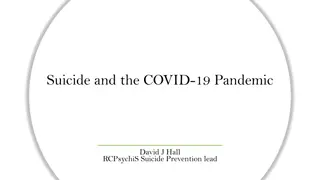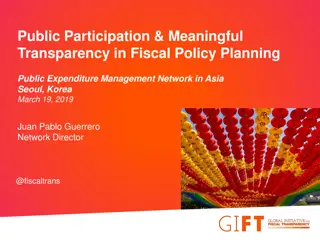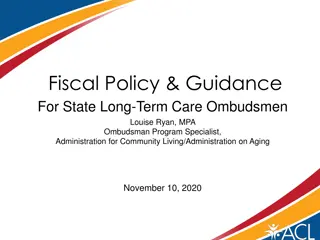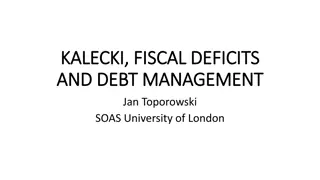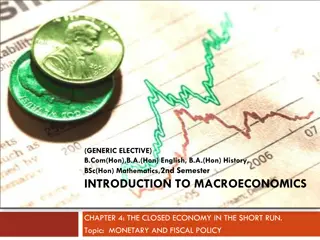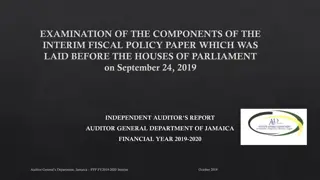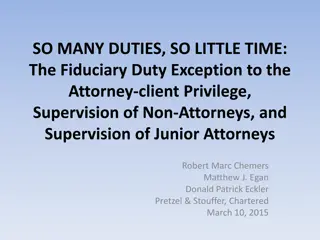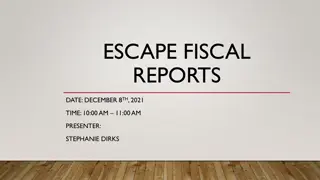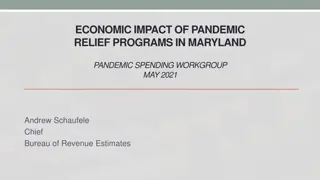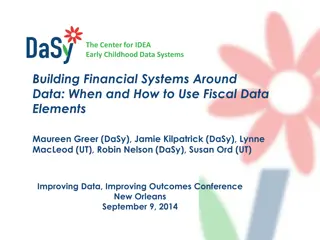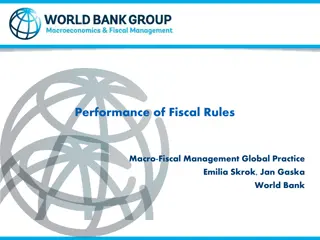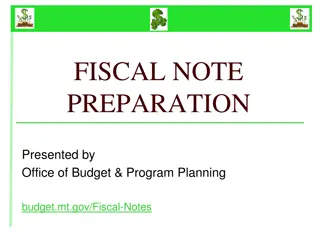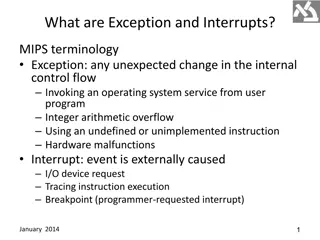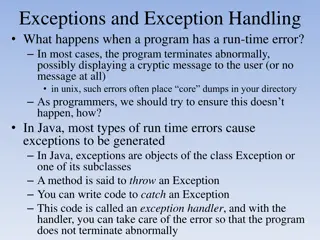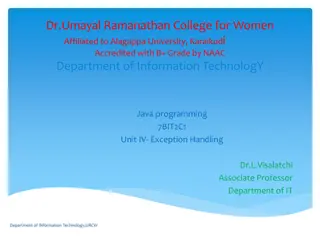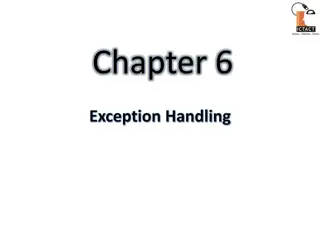EU Fiscal Policy in the Midst of the Pandemic: Rule or Exception?
Amidst the COVID-19 pandemic, the EU implemented a fiscal response involving a significant stimulus package and freezing of the Stability and Growth Pact. The link between the stimulus and freezing is crucial, supported by Council's recognition of exceptions for excessive deficits. Data on government deficits in various Member States further illustrate the context and challenges faced during the crisis.
Download Presentation

Please find below an Image/Link to download the presentation.
The content on the website is provided AS IS for your information and personal use only. It may not be sold, licensed, or shared on other websites without obtaining consent from the author.If you encounter any issues during the download, it is possible that the publisher has removed the file from their server.
You are allowed to download the files provided on this website for personal or commercial use, subject to the condition that they are used lawfully. All files are the property of their respective owners.
The content on the website is provided AS IS for your information and personal use only. It may not be sold, licensed, or shared on other websites without obtaining consent from the author.
E N D
Presentation Transcript
EU Fiscal EU Fiscal Policy Policy in in the the Midst or or the exception exception become Midst of of the the Pandemic Pandemic Should Shouldthe become the the rule? rule? Antonio Estella Jean Monnet Chair ad personam in Law of EU Economic Governance UC3M
The EUs fiscal response to the covid crisis: - Has two main prongs: Fiscal impulse (750 billion) Freezing of the Stability and Growth Pact
Both aspects are of course interlinked. As a matter of fact, I will go to the second one (SGP freezing) through the first one (fiscal stimulus), as a way to give some systematic to my presentation.
We know about the first one, but let us remember a couple of basic points
As regards the second one (freezing), the Commission proposed to freeze the SGP here:
The bridge between the stimulus package and the freezing of the SGP is given in article 10 of regulation 2021/241 establishing the Recovery and Resilience Facility
As has been seen, the Council has determined the existence of an exception, so therefore both commitments and payments could not be suspended at least for the reason of a Member State incurring in an excessive deficit
Government Deficit 2020 (planned by Com) Member State Situation Italy UK Spain Estonia France Poland Slovakia Austria Denmark Belgium Latvia Finland Slovenia Germany Lithuania Croatia Malta Portugal Greece Holland Ireland Sweden Hungary Czechia 11,10%ED-exception 10,70%(ED)-(exception) 10,30%ED-exception 10,10%ED-exception 9,90%ED-exception 9,50%ED-exception 8,50%ED-exception 8%ED-exception 8%ED-exception 7,50%ED-exception 7,30%ED-exception 7,20%ED-exception 7,20%ED-exception 7%ED-exception 6,90%ED-exception 6,80%ED-exception 6,70%ED-exception 6,50%ED-exception 6,40%ED-exception 6,30%ED-exception 5,60%ED-exception 5,60%ED-exception 5,20%ED-exception 5,10%ED-exception Luxembourg 4,80%ED-exception Cyprus Bulgaria 4,30%ED-exception 3,10%ED-exception
Bottom line All the Member States have been granted an exception, except for Romania, for which there is still an ongoing EDP
Exceptions 1) Which are these 2) Genesis 3) Interpretations 4) Implications for law as credibility
Genesis - Not in original 1466/97 and 1467/97 - Not in the 2005 reforms - But in the 2011 reforms (six pack). - So, introduced via: - Regulation 1175/2011 (as regards the 1466/97 exceptions) - And regulation 1177/2011 (as regards the 1467/97 exceptions)
Bottom line-criterion: Severe economic downturn in the euro-area or the Union as a whole But (and this but is important) There is another criterion that has been overlooked in the current crisis: unsual event outside the control of the Member State concerned having a major impact on the financial position of the general government
Interpretations The interpretation that has been given by the Commission is that the first criterion applies to the whole of the euro-area or the Union and is equivalent to the so-called general escape clause (EC, Communications of 13 March 2020 and 20 March 2020). The second criterion would be only applicable to individual Member States.
Unclear aspects Why Romania has then not been granted an exception? What is an event outside the control of a Member State? What is the difference between this criterion and the criterion severe And, more importantly: how to assess that we are before of a severe economic downturn in the euro area of the Union as a whole?
The debate between rules versus discretion re- emerges here again, as regards the severe criterion The European Commission has been careful not to define this criterion when it has requested the activation of the escape clause to the Council In turn, the Council has just confirmed that we are before a severe economic downturn, without measuring it However, other actors are pressing for a more rules-based approach. This is the case of the European Fiscal Board, for example. The EFB: attempts to quantify what a severe economic downturn is advocates for the deactivation of the escape clause as soon as the severe economic downturn is over advocates for a sunset clause to be put on the top of the escape clause. (https://ec.europa.eu/info/sites/info/files/2020_06_25_efb_assessment_of_euro_area _fiscal_stance_en.pdf)
However, it also says that (and this however is an important one) Progress towards a genuine central fiscal capacity focusing on the protection of growth enhancing government expenditure makes the return to a rules-based EU framework for national fiscal policies a natural complement
This makes me go to the final point of this talk, the connection between exceptions and problems of credibility What was awkward from the perspective of credibility was to expect that a rules-based approach would be implemented in the absence of a central fiscal capacity (a Fiscal Union). With a strong central fiscal capacity, the EU could demand fiscal discipline to its Member States in exchange of fiscal support Without a strong central fiscal capacity it was not credible to think that the Member States would rigidly stick to the SGP and that the sanctions system enshrined therein would be implemented. This is, in fact what happened. Reality tried to conform to law (but it couldn t) In my opinion, the debate on exceptions to the SGP offers an opportunity to modify the EU fiscal system and go to an open method of coordination-like system. Rules would become desirable targets that would, as the case may be, unfold a process of naming and shaming. This should be taken into account by the European Commission in the current process of review of EU economic governance. This would do until a strong central capacity would be established in the EU edifice of economic governance Going to a OMC-like system would produce gains from the perspective of credibility and law as credibility: as for the first, the non-implementation of the sanctions system (for example), as a consequence of the turn to an open method of coordination-like system, would no longer be a problem, and markets would welcome this development; from the perspective of law as credibility, the credibility of the law would be restored, since the system would fly away from a rules-based approach and would be more discretionary (this is what happens today, as a matter of fact). Law and reality would go hand in hand.
So yes: the exception should in my opinion become the rule, unless the EU decided to create a strong fiscal central instrument to combat crises (at the minimum).



